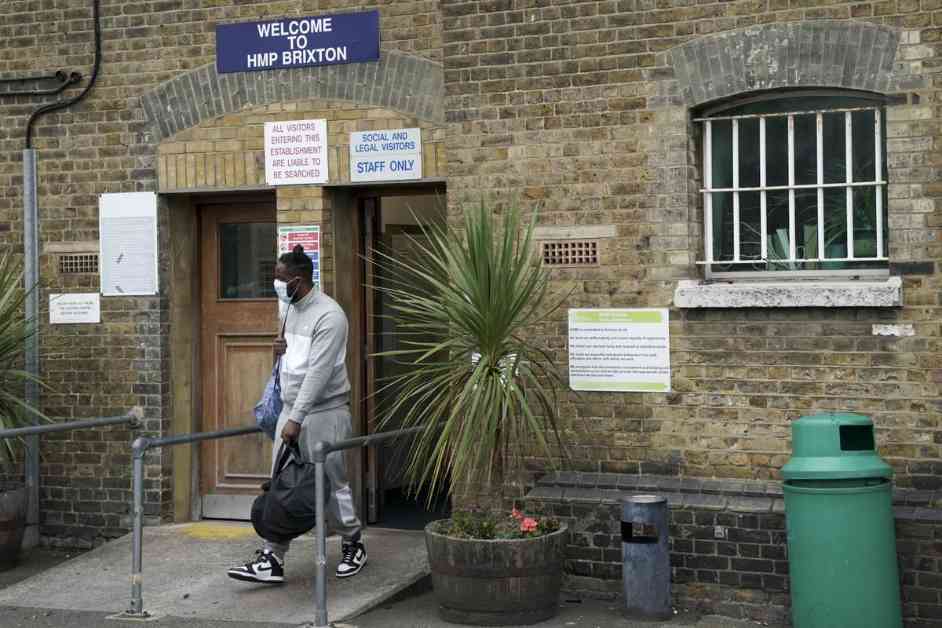The recent reduction in the prison population in England and Wales has been a topic of much discussion and debate. The Government’s decision to release hundreds of inmates early has resulted in a significant decrease in the number of individuals behind bars. According to Ministry of Justice (MoJ) figures, there were 86,333 prisoners in custody on Friday, which is 2,188 fewer than the previous week. This represents a 2% decrease in the overall prison population within a seven-day period.
Early Release Initiatives
The Government’s move to release around 1,750 prisoners early from jails across England and Wales has raised concerns and sparked controversy. While this decision was made in response to the overcrowding crisis in prisons, it has been met with mixed reactions from the public and policymakers. The early release initiative, announced by Justice Secretary Shabana Mahmood in July, aims to temporarily reduce the proportion of sentences that certain inmates must serve behind bars from 50% to 40%. This policy has been implemented as a response to the mounting pressure on the prison system, which has been pushed to the brink of collapse.
Prime Minister Sir Keir Starmer defended the early release of criminals, including some convicted killers, citing the urgent need to address the overcrowding and capacity issues in prisons. Despite criticism and concerns about the potential risks associated with releasing inmates early, the Government has emphasized the necessity of taking immediate action to alleviate the strain on the prison system. The mass exodus of prisoners this week marks the enforcement of the early release policy, as prisons struggle to accommodate the growing number of individuals in custody.
Impact on Prison Capacities
The reduction in the prison population has had a significant impact on the operational capacities of English and Welsh prisons. With the current number of inmates standing at 86,333, there is now cell space for 3,219 additional individuals. This surplus capacity provides some breathing room for the overcrowded prison system, allowing for better management of resources and facilities. However, concerns remain about the long-term implications of early release initiatives on public safety and the potential for reoffending among released inmates.
Data published by the MoJ reveals that many prisons in England and Wales were operating at or near full capacity at the end of last month. Prisons like Leyhill category D jail in Gloucestershire and The Verne category C prison in Dorset reported populations that matched or exceeded their operational capacities. This highlights the ongoing challenges faced by the prison system in managing the influx of inmates and maintaining adequate space for individuals in custody. The contingency measures put in place by the MoJ, such as keeping additional cell spaces free above the overall operational capacity, are crucial for ensuring the flexibility and resilience of the prison estate.
Concerns and Criticisms
Despite the Government’s efforts to address the overcrowding crisis in prisons, the early release of inmates has raised concerns and criticisms from various quarters. Critics argue that releasing criminals early, including those convicted of violent offenses like manslaughter, poses a significant risk to public safety. The exclusion of certain offenders, such as domestic abusers and rioters involved in the summer’s unrest, from the early release scheme has also sparked controversy and debate.
Prisons watchdog Charlie Taylor has warned that the early release of inmates under the current scheme is “risky” and could lead to reoffending and a return to prison for some individuals. The lack of adequate housing and support for released prisoners has also been a point of contention, with concerns raised about the potential placement of homeless inmates in taxpayer-funded budget hotels. As MPs and policymakers grapple with the challenges of managing the prison population and ensuring public safety, the Government has committed to reviewing the early release policy after 18 months to assess its effectiveness and impact on the criminal justice system.
In conclusion, the recent reduction in the prison population in England and Wales has brought to light the complex issues surrounding overcrowding, early release initiatives, and public safety concerns. While the Government’s efforts to alleviate the strain on the prison system are commendable, the long-term implications of releasing inmates early must be carefully considered and addressed. As policymakers and stakeholders continue to navigate the challenges of managing the prison population, it is essential to prioritize public safety and the rehabilitation of offenders to ensure a fair and effective criminal justice system.












